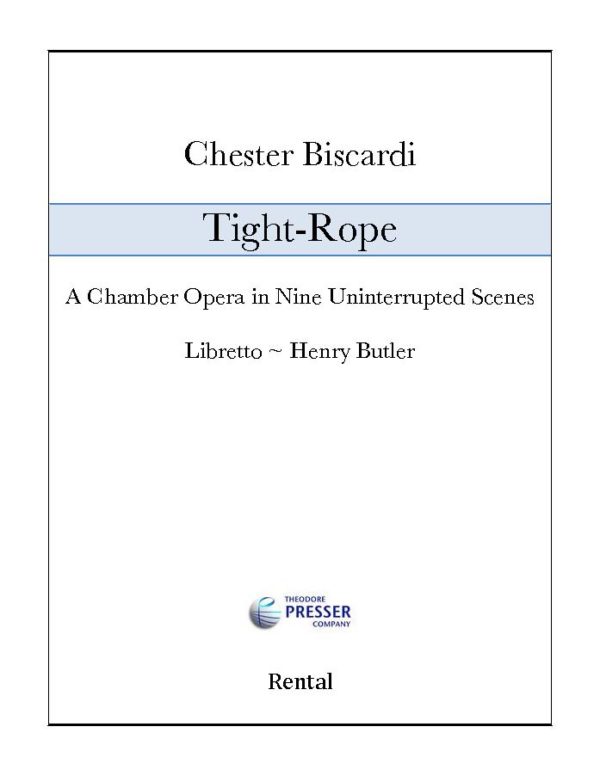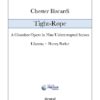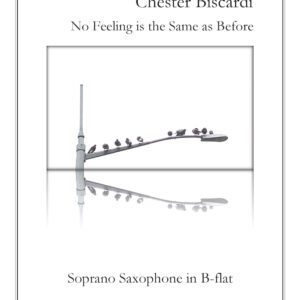Description
Audio
Listen here (starting at 01:10:20).
Chester Biscardi, Henry Butler: “I had forgotten such sincerity” (Tight-Rope). John Reardon, baritone, Karlos Moser, conductor, University of Wisconsin Madison School of Music and Department of Theatre and Drama [PBS, live October 1985]
Video
Premiere
First performances: University of Wisconsin-Madison School of Music and Department of Theatre and Drama
Carol Rennebohm Theater, Music Hall
5-26 October 1985
Videotaped by WHA-TV, Public Television
Luther Dane: John Reardon/Peter Halverson
The Actor: Marcus Haddock/John Webber
Sara: Susan Powell/Leslie Esser
Kathryn: Adria Firestone/Marcia Roberts
The Interviewer: Mimmi Fulmer/Margaret Walters
Luther's Manager: Ilona Kombrink
Critic # 1: John Webber/Cary Michaels
Critic # 2: Samuel Jones/Kevin Jeffers
Willie: David Hottman
Music Director, Karlos Moser
Stage Director, Del Lewis
Scenic Designer, John Ezell
Lighting Designer, James Gage
Costume Designer, Karen Brown-Larimore
Stage Manager, Jean do Pico
Scenes I & III: 16 February 1985
Renee Santer, soprano (Winner of the Eleanor Steber Award) / Lee Velta, baritone / Michael Fardink, piano
The Musicians Club of New York Olga Koussevitsky Memorial Concerts: Bruno Walter Auditorium: The New York Public Library for the Performing Arts at Lincoln Center
New York, NY
Workshop: Scenes I, II, III, IV, & V: 23 May 1985
Peter Halverson, baritone / Marcus Haddock, tenor / Susan Powell, soprano / Mimi Fulmer, soprano / Ilona Kombrink, soprano / James Sheutte, bass-baritone / Melinda Moser, piano / Karlos Moser, Music Director
University of Wisconsin-Madison School of Music and Union Theater: Union Theater Great Hall
Madison, WI
Showcase, Scene V: 17 November 1988
Corlyn Longer, soprano / Kurt Troyer, tenor / Kenneth Lee, baritone / Steven Morris, piano / William Appel, Director of Opera, Western Michigan State University
National Opera Association 34th Annual Convention
Columbus, OH
Instrumentation
4 Sopranos: The Interviewer (Coloratura [B-flat3 — D5]); Sara (Lyric Mezzo [A#3 — A5]); Kathryn (Dramatic Mezzo [G3 — G5]); Luther's Manager (Mezzo or Dramatic [B-flat3 - E-flat5]);
2 Tenors: The Actor [C#3 — B4]; Critic #1 [D3 — B4];
1 Baritone: Luther Dane [B-flat2 — G4];
1 Bass-Baritone: Willie [A2 — G#4];
1 Bass: Critic #2 [A2 — F#4]
Fl. (also Picc.), E. Hn., Cl. (also B. Cl.), Bsn.; Sop. Sax. (also Ten. Sax.); 2 Hns., Tpt., Trb.; 3 Perc.; Hp.; Pn.; Strs. (at least 33322; reduced version 11111)
Commissioner
Commissioned by the University of Wisconsin-Madison School of Music for the celebration of its 90th Anniversary and the opening of its newly renovated Music Hall
Publisher
Merion Music, Inc./Theodore Presser Co. No. 417-41028: Full Score | Libretto | Rental
Program Notes
Tight-Rope, a chamber opera in nine uninterrupted scenes (1985), is on rental from Merion Music, Inc./Theodore Presser Co. Commissioned by the University of Wisconsin-Madison School of Music for the celebration of its 90th Anniversary and the opening of its newly renovated Music Hall. Videotape: WHA-TV, Public Television
The Story
The legend of Luther Dane, poet and cult hero, enhanced by his mysterious disappearance and presumed death, is now the subject of a film biography. On the first day of shooting, work is disrupted when the actor portraying Dane angrily insists that his lines could not be the words of the man whose life and poetry he so admires.
Left alone to sort out his feelings, the Actor is suddenly face-to-face with Luther Dane, very much alive, an unsuspected witness to the filming. Intrigued by the Actor’s concern for integrity in his portrayal, the poet offers to piece together the not so well-known story of his life and “death.”
Through Dane’s memories and actual encounters, the Actor experiences the poet’s explosive career, the women and men (a brash interviewer; his seductive manager; Sara, his first love; Kathryn, a mature love; two critics – one nonsensical, the other serious; and Willie, an alcoholic) who shaped his life, and his powerful influence when he spoke to his dedicated followers. Most important, the Actor learns the truth about Dane’s escape from an unbearable public image.
When the poet abruptly takes leave of him, the Actor begins to find the words and images he must use if he is to portray with honesty the life of Luther Dane . . .
Time: The present.
Press
Commissioned by the University of Wisconsin in celebration of the ninetieth anniversary of its School of Music and the refurbishing of its historic Music Hall, Tight-Rope is a remarkably human account of a man's search for identity and the risk involved not only in the search, but in being true to the discovery. It received its first performances at UW October 5 and 6 [1985] in a production conducted by Karlos Moser and directed by Del Lewis with sets designed by John Ezell.
"We walk a tight-rope," declares the Actor to Luther Dane in the opera's opening scene. "One false step, one dishonest word, and we fall - we deserve to fall!" Dane (movingly sung by John Reardon) has arranged his "death," but lives on; he has returned to help the Actor discover who he truly is. The Actor (compellingly portrayed by Marcus Haddock) through a series of encounters with past and present lovers (Susan Powell and Adria Firestone), a manager (Ilona Kombrink), a television interviewer (Mimmi Fulmer), critics (John W. Webber and Samuel Jones), and a drinking partner (David Hottmann) - individuals who reveal the different and seemingly contradictory side of Dane's personality.
Biscardi sets the encounters by translating into sound the music already implicit in Butler's text. Words and melodic line are inseparable. Biscardi's elegant music is immediately accessible, at times even tuneful, although not tuneful in the manner of a Menotti, Floyd, or Bernstein. Rather than a tune implying a structure into which a text is fit, Biscardi's tunes are generated by the text, and as the text changes, the tune changes. The vocal lines are undergirded with a vivid instrumental score that illuminates the characters' inner motions. The Actor, as he attempts to reconcile the sides of Dane's personality, can be heard to think through the orchestra - as can Dane, reliving the anguish of his life.
In the silence and the darkness - indeed, throughout the entire ninety-minute opera - Biscardi and Butler also challenge the members of the audience to begin their own quiet journey to a part of themselves where their own separate identities - lover, striving saint, fool - can be embraced and accepted into the unity of a single personality, a personality of exciting, ever challenging diversity and limitless possibilities.






